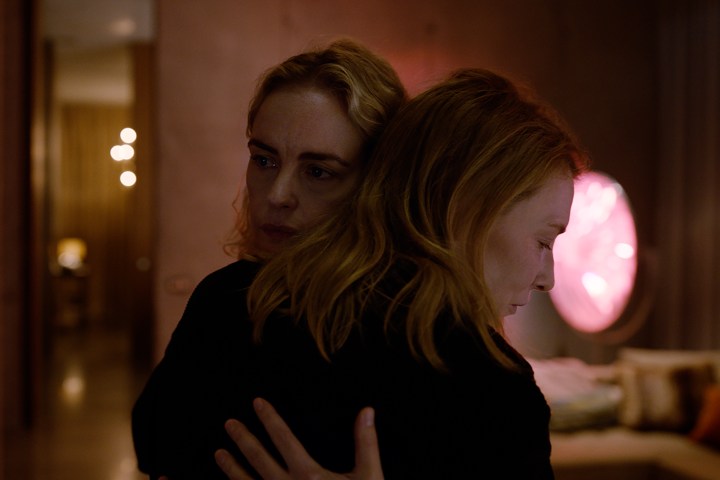
[ad_1]
“Had she said no, the film would never have seen the light of day,” director Todd Field stated in a press release about his bold new drama, Tár. He was, in fact, speaking in regards to the movie’s star, Cate Blanchett, whose popularity as considered one of Hollywood’s biggest residing actresses actually precedes her at this level. Despite that truth, it could be straightforward to initially shrug off Field’s remark as nothing greater than a pandering or superficial comment. After all, what director wouldn’t say that in regards to the lead star of their movie, particularly somebody of Blanchett’s caliber?
Having seen Tár, although, the reality of Field’s remark is undeniably clear. In order for it to solid any type of spell, Tár requires a performer with Blanchett’s charismatic, towering presence. It calls for somebody who can’t solely disappear into a personality, however who can accomplish that and nonetheless be capable to command each scene accomplice who has the misfortune of being pitted in opposition to her. Blanchett does that and extra in Tár.
Not since she stood exterior Howard Hughes’ projection room in The Aviator has Blanchett so deeply sunk herself into the pores and skin of considered one of her characters, and never since Blue Jasmine has she so totally and deliciously chewed up and spit out the very movie wherein she stars. Her efficiency right here is likely to be one of the best she’s ever given, and even when Tár feels extra substantial as a personality examine than it does as a chunk of social commentary, its deserves are evident in each flick of the wrist and verbal dismantling that Blanchett delivers as its overly dignified, eponymous composer.

Contrary to what that latter remark suggests, Tár is under no circumstances an easy movie. Not solely do its first 10 minutes revolve fully round a public dialog between Blanchett’s completed composer, Lydia Tár, and real-life New Yorker author Adam Gopnik, however it strikes at such a gradual, measured tempo that it turns into inconceivable to foretell the trajectory of its story till the touchdown is already underway. Anyone searching for a easy construction in Field’s script will come up empty-handed.
The movie begins with Blanchett’s Lydia very a lot on high of the world. Having already confirmed herself as one of many world’s most formidable and provoking composers, she’s not solely on the verge of releasing a brand new memoir (appropriately titled Tár on Tár), however she’s starting rehearsals for a efficiency of Gustav Mahler’s Symphony No. 5, which has eluded her all through her total profession. The movie’s opening dialog between Gopnik and Blanchett is, due to this fact, an efficient, extraordinarily tongue-in-cheek method for Tár to determine each Lydia’s accomplishments and her standing inside her area.
From there, Field spends the majority of Tár’s formidable 158-minute runtime following Lydia as she prepares for her and her German orchestra’s efficiency of Mahler’s composition. Along the best way, we’re launched to a very powerful figures in Lydia’s life, together with her spouse .Sharon (Nina Hoss). and her assistant. Francesca (Noémie Merlant), in addition to Olga Metkina (Sophie Kauer), the blunt younger Russian cellist who catches Lydia’s eye early on within the movie. Through her interactions with these characters and their rehearsals collectively, Field slowly however absolutely crops the seeds for Tár’s stunning but inevitable third-act flip.

The fewer particulars which can be given about Tár’s conclusion, together with its memorably acidic ultimate shot, the higher. However, Field does work early on to fill Tár with a way of gradual, impending doom, and he employs plenty of easy however efficient methods so as to take action. From the ominous pictures of somebody watching Blanchett’s Lydia from afar to the array of quiet noises that consistently catch her consideration, Field provides his protagonist loads of causes to imagine that somebody — or one thing — is continually standing proper behind her.
The director additionally makes nice use of Berlin’s city sprawl. In one sequence, Lydia searches, hopelessly, in a public park for the supply of 1 girl’s relentless screaming, whereas one other sees her delve into the flooded halls of an deserted, underground faculty. The latter sequence is when the shades of horror current in Tár come all the best way to the forefront, and it leaves a disquieting mark that neither the movie nor Blanchett’s Lydia is ever in a position to actually shake. Its sudden, bone-crunching conclusion additionally serves, in a method, as an ideal lead-in to Tár’s uncompromising ultimate third, which sees Blanchett’s assured composer pay for her rampant conceitedness and abuses of energy in as fashionable a method as doable.
Unfortunately, as well timed as Tár’s ultimate moments are, they don’t fairly justify the movie’s 2-and-a-half-hour runtime. For a movie that feels, at occasions, as weighty and metaphysical as the rest you’ll see this yr, it’s undeniably odd to see it arrive on the decisive, easy conclusion that it does. In the tip, there’s an unavoidable sense of disconnect between the nuanced, summary beast that Tár is all through a lot of its runtime and the thesis on cancel tradition and #MeToo that it finally ends up turning into.

Part of that disconnect is the results of the operatic, muscular visible fashion that Field brings to Tár. Here, Field totally embraces the type of widescreen aesthetic that may make each room and environmentthat Blanchett’s Lydia strikes via really feel large and open. The director’s use of lengthy, unbroken takes additionally permits him to spotlight Blanchett’s personal inherent magnetism. By slicing as little as doable at any time when his star is on-screen, Field is ready to current Lydia’s significantly commanding presence as nakedly — and, due to this fact, powerfully — as doable.
This approach provides Blanchett the prospect to dominate a movie in a method that only a few actors are ever allowed to, and she or he doesn’t let it move her by. Even within the moments when Lydia’s grasp on her state of affairs is beginning to slip, Blanchett’s vise-like grip over Tár is ever-present. The movie is, with out query, the type of one-woman present wherein only a few different performers are given the prospect to shine. In the case of Tár, the one different actor who manages to make a lot of an impression is Hoss, whose quiet efficiency as Lydia’s weak however wiser-than-she-lets-on spouse emerges as the proper counterweight to Blanchett’s ferocious lead flip.
It’s Blanchett’s efficiency that makes the largest and most impactful impression in Tár, although. Her work right here manages to carry a broader attraction to a movie with pursuits and references so area of interest that it may need in any other case felt like an excessive amount of of an inside joke to make any type of a long-lasting mark. Whether or not Blanchett’s efficiency is highly effective sufficient to actually wrangle collectively all of Tár’s concepts into one compelling piece is one other matter altogether. What she and Field have achieved right here is actually value applauding, however Tár’s highs additionally really feel too compelling and regarded for it to devolve into the cancel culture-focused treaty on the toxicity of energy that it finally turns into. Then once more, perhaps that’s the entire level.
Tár hits theaters in New York and Los Angeles on Friday, October 7. It will develop nationwide all through the month.
Editors’ Recommendations
[ad_2]